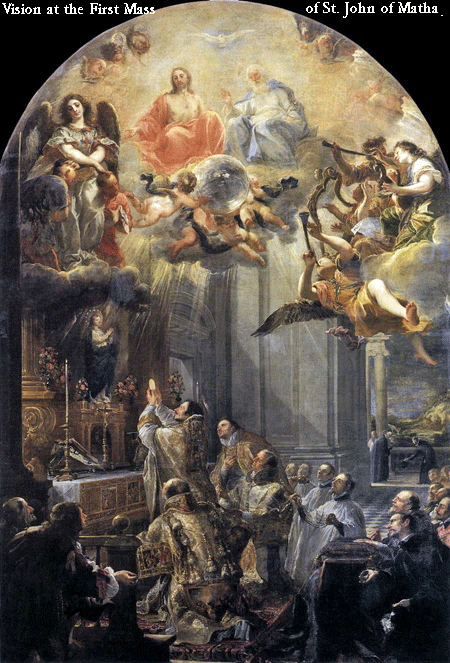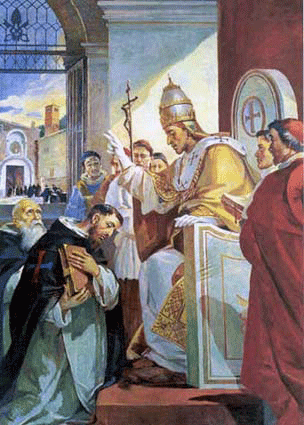

We were celebrating, not many days ago, the memory of St. Peter Nolasco, who was inspired, by the Holy Mother of God, to found an Order for the ransoming of Christian captives from the Muslim infidels: today, we have to honor the generous Saint, to whom this sublime work was first revealed. He established, under the name of the Most Holy Trinity, a body of religious men, who bound themselves by vow to devote their energies, their privations, their liberty, nay, their very lives, to the service of the poor slaves who were groaning under the Saracen yoke. The Order of Trinitarians, and the Order of Mercy, though distinct, had the same end in view, and the result of their labors, during the centuries of their existence, had been the restoration to liberty and preservation from apostasy of upwards of a million slaves. St. John of Matha, assisted by his faithful cooperator, St. Felix of Valois (whose feast we shall keep at the close of the year), established the center of his grand work at Meaux, in France. We are preparing for Lent, when one of our duties will have to be that of charity towards our suffering brethren: what finer model could we have than St. John of Matha, and his whole Order, which was called into existence for no other object than that of delivering from the horrors of slavery brethren, who were utter strangers to their deliverers, but were in suffering and in bondage. Can we imagine any almsgiving, let it be ever so generous, which can bear comparison with this devotedness of men, who bind themselves by their Rule, not only to traverse every Christian land begging alms for the ransom of slaves, but to change places with the poor captives, if their liberty cannot be otherwise obtained? Is it not, as far as human weakness permits, following to the very letter the example of the Son of God Himself, Who came down from Heaven that He might be our ransom and our Redeemer? We repeat it: with such models as these before us, we shall feel ourselves urged to follow the injunction we are shortly to receive from the Church, of exercising works of mercy towards our fellow-creatures, as being one of the essential elements of our Lenten penance.
But it is time we should listen to the account given us by the Liturgy of the virtues of this apostolic man, who has endeared himself, both to the Church and to mankind, by his heroism and charity:
St. John of Matha, the institutor of the Order of the Most Holy Trinity for the Ransom of Captives, was born at Faucon, in Provence, of parents conspicuous for their nobility and virtue. He went through his studies first at Aix, and afterwards at Paris, where after having completed his theological course, he received the degree of doctor. His eminent learning and virtue induced the Bishop of Paris to promote him, in spite of his humble resistance, to the Holy Order of Priesthood, that, during his sojourn in that city, he might be a bright example to young students by his talents and piety. While celebrating his first Mass in the Bishop's chapel, in the presence of the Prelate and several assistants, he was honored by a signal favor from Heaven. There appeared to him an Angel clad in a white and brilliant robe; he had on his breast a red and blue cross, and his arms were stretched out, crossed one above the other, over two captives, one a Christian, the other a Moor. Falling into an ecstasy at this sight, the man of God at once understood that he was called to ransom captives from the infidels.
 But, that he might the more prudently carry out so important an undertaking, he withdrew into solitude.
There, by divine appointment, he met with St. Felix of Valois, who had been living many years in that same desert.
They agreed to live together, and for three years St. John devoted himself to prayer and contemplation,
and the practice of every virtue. It happened, that as they were one day seated near a fountain,
conferring with each other on holy things, a stag came towards them, bearing a red and blue cross between his antlers.
St. John, perceiving that St. Felix was surprised by so strange an occurrence, told him of the vision he had had in his first Mass.
They gave themselves more fervently than ever to prayer, and having been admonished in sleep, they resolved to set out for Rome,
there to obtain permission to found an Order for the ransom of captives. Pope Innocent III, who had shortly before been elected Pope,
received them kindly, and while deliberating upon what they proposed, it happened that as he was celebrating Mass in the Lateran basilica,
on the second feast of St. Agnes, there appeared to him, during the elevation of the sacred Host, an Angel robed in white,
bearing a two-colored cross, and in the attitude of one that was rescuing captives. Whereupon, the Pontiff gave his approbation
to the new institute, and commanded it to be called the Order of the Most Holy Trinity for the Ransom of Captives,
bidding its members wear a white habit, with a red and blue cross.
But, that he might the more prudently carry out so important an undertaking, he withdrew into solitude.
There, by divine appointment, he met with St. Felix of Valois, who had been living many years in that same desert.
They agreed to live together, and for three years St. John devoted himself to prayer and contemplation,
and the practice of every virtue. It happened, that as they were one day seated near a fountain,
conferring with each other on holy things, a stag came towards them, bearing a red and blue cross between his antlers.
St. John, perceiving that St. Felix was surprised by so strange an occurrence, told him of the vision he had had in his first Mass.
They gave themselves more fervently than ever to prayer, and having been admonished in sleep, they resolved to set out for Rome,
there to obtain permission to found an Order for the ransom of captives. Pope Innocent III, who had shortly before been elected Pope,
received them kindly, and while deliberating upon what they proposed, it happened that as he was celebrating Mass in the Lateran basilica,
on the second feast of St. Agnes, there appeared to him, during the elevation of the sacred Host, an Angel robed in white,
bearing a two-colored cross, and in the attitude of one that was rescuing captives. Whereupon, the Pontiff gave his approbation
to the new institute, and commanded it to be called the Order of the Most Holy Trinity for the Ransom of Captives,
bidding its members wear a white habit, with a red and blue cross.
The Order being thus established, its holy founders returned to France, and erected their first monastery at Cerfroid, in the diocese of Meaux. St. Felix was left to govern it, and St. John returned, accompanied by a few of his brethren, to Rome. Pope Innocent III gave them the house, church, and hospital of St. Thomas de Formis, together with various revenues and possessions. He also gave them letters to Miramolin, King of Morocco, and thus was prosperously begun the work of ransom. St. John afterwards went into Spain, a great portion of which country was then under the Saracen yoke. He stirred up kings, princes, and others of the faithful, to compassion for the captives and the poor. He built monasteries, founded hospitals, and saved the souls of many captives by purchasing their freedom. Having, at length, returned to Rome, he spent his days in doing good. Worn out by incessant labor and sickness, and burning with a most ardent love of God and his neighbor, it was evident that his death was at hand. Wherefore, calling his brethren round him, he eloquently besought them to labor in the work of ransom, which Heaven had entrusted to them, and then slept in the Lord, on the sixteenth of the Calends of January (December 17), in the year of grace 1218. His body was buried with the honor that was due to him in the same church of St. Thomas de Formis.
Dear friend and liberator of slaves, pray, during this holy season, for those who groan under the captivity of sin and Satan; for those, especially, who, bound with the frenzy of earthly pleasures, feel not the weight of their chains, but sleep on peacefully through their slavery. Ransom them by thy prayers, convert them to the Lord their God, lead them back to the land of freedom. Pray for France which was thy country, and save her from infidelity.
Contact us: smr@salvemariaregina.info
Visit also: www.marienfried.com